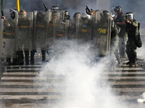
The streets of every major city in Venezuela continue to be war zones as President Nicolás Maduro escalates the military repression of opposition protesters looking for an escape from socialist dictatorship. After announcing a new “e-card” to ration goods, Maduro sent the military into the capital of Caracas to beat and arrest dissidents.
In a rally yesterday, Maduro announced new electronic ration cards that would track every purchase by every Venezuelan as part of an initiative to limit the amount of food each Venezuelan buys that the president calls “Mission Nutrition.” The card would only work in government-run supermarkets–increasingly the norm in the country–and would make those who use it eligible for rewards like public housing and cars.
The Venezuelan economy is so impoverished that the ration cards would also serve to track the massive upswing in black market sales of goods such as basic food and toilet paper. What Maduro did not specify is that the card would serve as surveillance for those who buy up goods to sell on the black market later, particularly in western Venezuela where goods are increasingly rare thanks to their staunch opposition to socialism.
In opposition strongholds like western capital San Cristóbal, electricity is not guaranteed and wireless internet a rarity. San Cristóbal has been the focus of much of the most violent repression, including the Venezuelan National Guard shooting teargas into civilian apartment buildings while people sleep. San Cristóbal received a respite this weekend, however, as Maduro kept his promise to send the military into an opposition-controlled square in the capital, Caracas.
Last week, Maduro warned protesters in Altamira Square–who he calls “Chuckys” like the 1990s horror film character–to evacuate or face the wrath of the Venezuelan military. Yesterday, the armed forces stormed the square, arresting dozens and spraying many more with teargas and water cannons. Video surfacing from Altamira is graphic, showing soldiers beating protesters on the ground with helmets. Reports indicate that more than 60 students have been arrested in Altamira in the past 24 hours.
Today, red-shirted armed motorcycle gangs in the service of Maduro’s government have been recorded maintaining a threatening and permanent presence in Altamira:
Opposition leader Henrique Capriles Radonski, who won the presidential election last October but lost to Maduro due to election fraud, is attempting to meet with Maduro to discuss the frustrations of the opposition regarding Maduro’s gross violation of their human rights since protests escalated on February 12. Maduro claimed he was open to the proposition, but so far no date has been set for Capriles to meet with Maduro.
Protesters, meanwhile, continue to organize and protest against the human rights violations they have suffered under Maduro. Protests escalated early this year as opposition party leader Leopoldo López organized a peaceful protest against socialist economic policies and was subsequently issued a warrant on “terrorism” and “arson” charges. López remains in prison. The protests were not prompted, as both the BBC and The Guardian are bizarrely claiming, by “middle-class” protesters concerned about rape in San Cristóbal.
At least 28 people have died since López’s arrest, and the government has launched a full-scale campaign to kill, maim, or disfigure protesters to discourage their peaceful political advocacy.

COMMENTS
Please let us know if you're having issues with commenting.